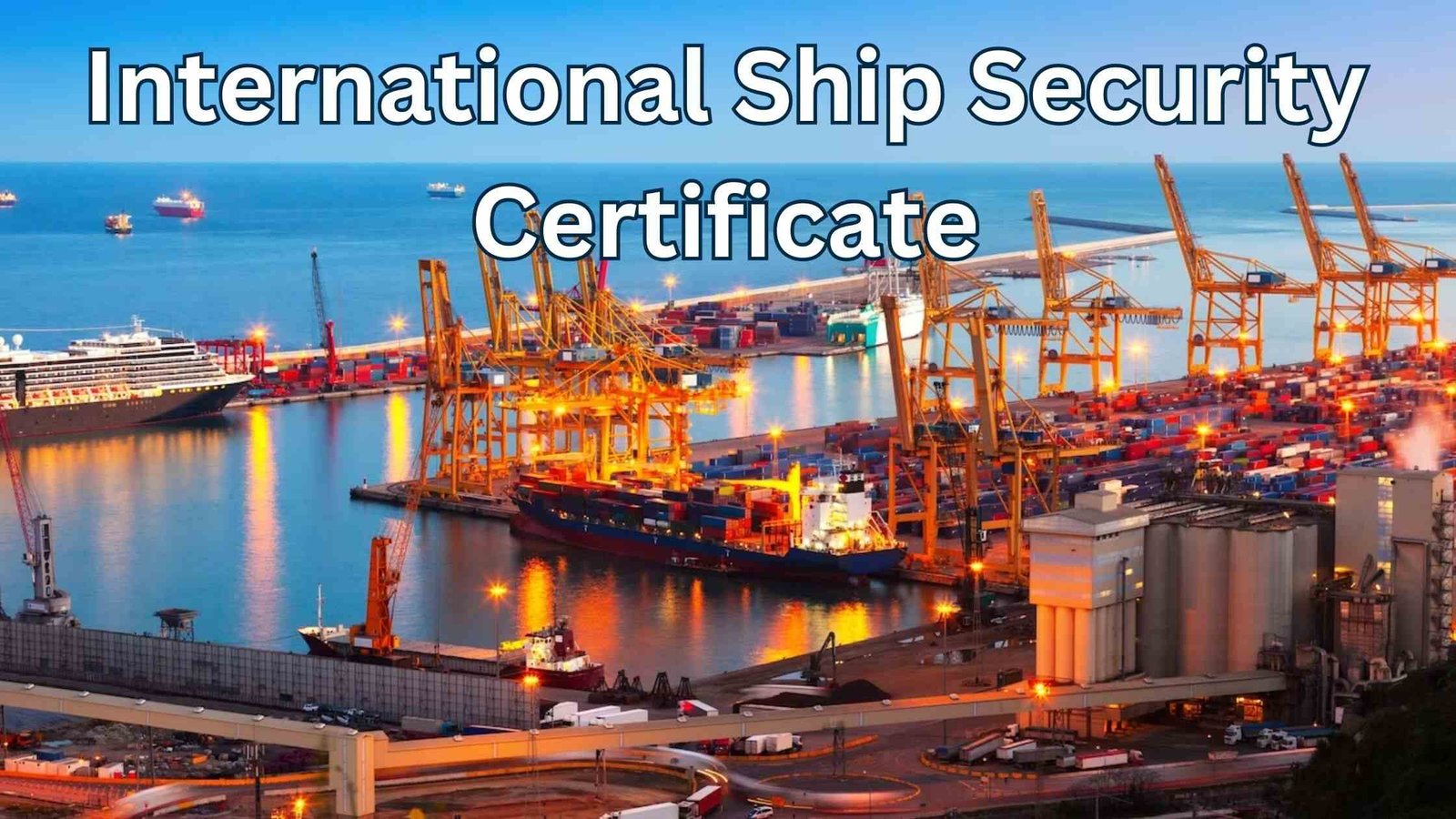The International Ship Security Certificate (ISSC) is a critical document in maritime security. It denotes that a vessel has successfully undergone a thorough security evaluation, demonstrating compliance with the International Code for the Security of Ships and Port Facilities (ISPS Code). The ISSC plays a pivotal role in guaranteeing the safety and security of ships, their crew, passengers, cargo, and port installations during international journeys. To acquire an ISSC, ships are required to formulate a Ship Security Plan (SSP), undergo a comprehensive Ship Security Assessment (SSA), and successfully pass rigorous verification procedures.
Importance of International Ship Security Certificate in the Maritime Industry
ISSC plays a pivotal role in ensuring the safety and security of ships, ports, cargo, and crew, especially in the context of today’s heightened security concerns.

Key points highlighting its importance are:
- Mandatory Requirement: The ISSC is a mandatory requirement under the International Ship and Port Facility Security (ISPS) Code, applicable to all vessels over 500 gross tons operating on international trades and the ports servicing them. This certification is essential to comply with international maritime security standards.
- Counterterrorism: In an era where maritime security is paramount, the ISSC is a vital tool in countering terrorism and unlawful acts. It helps prevent security threats within an international framework, safeguarding not only vessels but also global trade.
- Safety Assurance: The ISSC certifies that ships have implemented robust security measures, including Ship Security Plans (SSPs) and assessments, to protect against security incidents. This assurance enhances the safety of crew, passengers, and cargo.
- Global Compliance: The ISSC ensures that ships and ports worldwide adhere to standardized security protocols. This global compliance fosters trust in the maritime industry and facilitates international trade by reducing security risks.
The International Ship Security Certificate is an indispensable element in maintaining the security and integrity of the maritime industry. It serves as a linchpin in global efforts to protect ships, ports, and the people involved in maritime activities from security threats and challenges
International Ship Security Certificate Background
The historical context of the International Code for the Security of Ships and of Port Facilities (ISPS Code) and its role in enhancing maritime security is significant in understanding modern maritime safety protocols.
- ISPS Code Origin: This code was developed after the tragic events of September 11, 2001, in the United States. The possibility of ships being used as a medium of terrorist activity raised concerns within the International Maritime Organization.
- SOLAS Chapter XI-2: The ISPS Code was incorporated into the Safety of Life at Sea (SOLAS) Convention under Chapter XI-2. This chapter, titled “Special Measures to Enhance Maritime Security,” forms the legal basis for the ISPS Code’s implementation.
- Mandatory Security Regime: The ISPS Code, which came into force on July 1, 2004, established a comprehensive mandatory security regime for international shipping. It prescribes responsibilities to governments, shipping companies, ports, and government agencies, outlining minimum security arrangements for ships and ports.
- Global Maritime Security: The ISPS Code’s implementation plays a pivotal role in enhancing global maritime security. It addresses security threats within an international framework, ensuring that vessels, ports, cargo, and personnel are safeguarded against security incidents, including terrorism.
Together, they provide a structured and internationally recognized framework for enhancing maritime security and protecting the vital components of the shipping industry.
Purpose of the International Ship Security Certificate
The International Ship Security Certificate (ISSC) serves a main purpose in the maritime industry by enhancing security and eliminating security risks and threats. Its primary objectives are as follows:
- Protecting Persons on Board: The certificate ensures the safety and security of individuals aboard a ship. It requires the planning, development and implementation of a Ship Security Plan (SSP)..
- Safeguarding Cargo: The Ship Security Plan includes measures to secure cargo against security-related risks, theft, tampering, and damage during transit.
- Securing Port Facilities: The ISSC extends its security measures to port facilities. Ports are essential nodes in global trade, making them potential targets for security threats. The ISSC helps ensure that port facilities adhere to stringent security standards to deter and respond to security incidents.
- Mitigating Security Risks and Threats: The ISSC, in conjunction with the ISPS Code (International Ship and Port Facility Security Code), establishes a comprehensive security framework for the maritime industry. It outlines procedures, responsibilities, and protocols to detect, deter, and respond to security threats and incidents effectively.
It is an essential component of global maritime security efforts, addressing the challenges posed by evolving security risks and threats in the industry
Procedure for International Ship Security Certificate

The International Ship and Port Facility Security Code (ISPS Code) outlines a series of critical steps to enhance maritime security. These steps involve Ship Security Assessment (SSA), Ship Security Plan (SSP) development and approval, Interim International Ship Security Certificate (ISSC) issuance, and initial verification on board for the final ISSC.
Ship Security Assessment (SSA):
The SSA is a fundamental step in the ISPS Code’s implementation. It is a risk-based analysis of security hazards or threats for each ship a company operates. This assessment helps identify security vulnerabilities and forms the basis for developing effective security measures. SSA is essential for understanding and addressing security risks effectively.
Ship Security Plan (SSP) Development and Approval:
Following the SSA, the ship’s company develops the Ship Security Plan (SSP) based on the assessment’s findings. The SSP outlines security measures and procedures to mitigate identified risks. It specifies responsibilities and protocols for safeguarding personnel, cargo, and the ship. The SSP is submitted for review and approval.
Interim ISSC Issuance and Validity:
After the SSP is submitted, interim verification is conducted on board the ship. Upon successful verification, an interim International Ship Security Certificate (ISSC) is issued. This interim ISSC is valid for six months. It allows the ship to operate while final verification is pending.
Initial Verification for Final ISSC:
The final step involves an initial verification on board the ship to ensure full compliance with the ISPS Code and the approved SSP. Upon successful verification, the final ISSC is issued, indicating that the ship adheres to the required security standards. This certificate is valid for a specific duration and signifies that the ship is secure against security threats.
The ISPS Code’s implementation involves a systematic process starting with SSA to identify security risks, followed by SSP development and approval, interim ISSC issuance, and culminating in the initial verification on board for the final ISSC.
International Cooperation
The ISPS Code, aimed at enhancing maritime security, promotes collaboration between ships and port facilities through various mechanisms:
- Framework for Cooperation: The ISPS Code establishes a framework for cooperation between ships and port facilities to detect and deter security threats to maritime operations. It encourages both entities to work together in identifying potential risks and implementing security measures to mitigate them.
- Roles and Responsibilities: The ISPS Code clearly defines roles and responsibilities for ships and port facilities. It assigns the Ship Security Officer (SSO) on board ships with the responsibility of implementing security measures. Similarly, Port Facility Security Officers (PFSOs) are designated for port facilities. These officers are crucial in ensuring security compliance and facilitating cooperation between ships and ports.
- Exchange of Security Information: The ISPS Code encourages the exchange of security-related information between ships and port facilities. This includes sharing information on security threats, incidents, and suspicious activities. Effective information exchange is essential for coordinating security efforts and responding promptly to potential risks.
- Security Levels: Regulation XI-2/3 of the ISPS Code ensures that administrations establish security levels and provide strict security level data to ships flying their flag. This data exchange ensures that ships are aware of the security situation in the areas they navigate, allowing them to take appropriate precautions.
The ISPS Code fosters collaboration between ships and port facilities by defining roles, facilitating information exchange, and establishing a security framework. This cooperation is vital for safeguarding maritime operations from security threats and ensuring the safety and security of ships, ports, cargo, and crews.
Compliance and Enforcement

Compliance with the ISPS Code is of paramount importance for several reasons:
- Safety and Security: The ISPS Code is designed to enhance the safety and security of ships, ports, cargo, and personnel. Complying with its provisions helps ensure a safer maritime environment and minimizes security risks and threats.
- International Operations: Compliance is essential for ships and ports that engage in international operations. It enables them to meet the mandatory security requirements for international shipping, facilitating global trade and travel.
Consequences of Non-Compliance:
Non-compliance with the ISPS Code can have severe consequences. It may result in disruptions to maritime operations, potential legal liabilities, and damage to a facility’s reputation. Additionally, non-compliant ships may face detention in foreign ports or refusal of entry.
- Insurance Implications: Non-compliance can also lead to the loss of marine insurance coverage, which poses a significant financial risk to shipowners and operators. Insurance companies often require adherence to international security standards, including the ISPS Code, as a condition for coverage.
- Certification by Organizations: Organizations like RINA and LR play a crucial role in the certification process. They review and approve Ship Security Assessments (SSAs) and Ship Security Plans (SSPs) to ensure compliance with the ISPS Code. Certification from these organizations demonstrates a commitment to security standards and helps ships and ports gain international recognition.
The ISSC is a symbol of trust, assuring all stakeholders, from shipowners to port authorities, that the vessel adheres to stringent security protocols. It is more than a regulatory requirement; it is a testament to the industry’s dedication to safeguarding the seas against security threats.
As we navigate an increasingly interconnected world, the ISSC stands as a vital tool in maintaining the integrity of global maritime trade. It is a reminder that security knows no borders, and cooperation among nations and organizations is essential to ensure the safety of our oceans.




